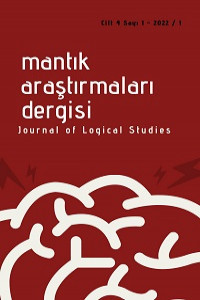Üç Mantıksal Teori
Bu çalışma, teori olarak düşünülen mantıksal sistemlerle ilgilidir. Geleneksel olarak verilen sistemleri makul bir şekilde çözmenin hedeflendiği sorunları araştırarak biz, mantıksal sistemlere yaygın olarak uygulanan yeterlilik ölçütlerinin mantığını açıklığa kavuşturuyoruz. Bu açıdan mantıksal sistemlerin üç temel türü var gibi görünüyor: bunlar mantıksal doğruluğa ilişkin olanlar, mantıksal doğruluk ve mantıksal gerektirme ile ilgili olanlar ve mantıksal doğruluk ve mantıksal gerektirme ile olduğu kadar, başlı başına çıkarım ile de ilgili olanlardır. İlk iki tipteki sistemler için yeterlilik ölçütleri şunları içerir: etkinlik, sağlamlık, tamamlanmışlık, Post tamamlanmışlığı, "güçlü sağlamlık" ve güçlü tamamlanmışlık. Bir mantıksal sistemin bir çıkarım teorisi olarak düşünülmesi, ispat sistemleri için iki yeterlilik ölçütü formüle etmeye çalışmamıza sebep olur. Birincisi, sıkılık kavramı veya delillerdeki boşluksuzluk(gaplessness) ile ilgilidir. İkincisi, bir kanıt sistemi için bir tamamlanmışlık koşuludur. Makalenin sonunda yer alan tarihsel bir not, üst sistem hiyerarşisi ile bu mantık alanının gerçek tarihsel gelişimi arasında dikkate değer bir paralellik olduğunu belirtmektedir.
Anahtar Kelimeler:
Mantık, Lojistik Sistemleri, Dedüktif Sistemler, Gerektirmeci Sistemler, Mantıksal Doğruluk
Three Logical Theories
This study concerns logical systems considered as theories. By searching for the problems which the traditionally given systems may reasonably be intended to solve, we clarify the rationales for the adequacy criteria commonly applied to logical systems. From this point of view there appear to be three basic types of logical systems: those concerned with logical truth; those concerned with logical truth and with logical consequence; and those concerned with deductionper se as well as with logical truth and logical consequence. Adequacy criteria for systems of the first two types include: effectiveness, soundness, completeness, Post completeness, "strong soundness" and strong completeness. Consideration of a logical system as a theory of deduction leads us to attempt to formulate two adequacy criteria for systems of proofs. The first deals with the concept of rigor or "gaplessness" in proofs. The second is a completeness condition for a system of proofs. An historical note at the end of the paper suggests a remarkable parallel between the above hierarchy of systems and the actual historical development of this area of logic.
Keywords:
Logic, Logical Systems, Logical Truth, Consequence Systems, Deductive Systems,
___
- Anderson, J. M., and Johnstone, H. W., Natural Deduction, Belmont, California, 1962.
- Bochenski, I. M., A History of Formal Logic (tr. Thomas, Ivo), Notre Dame, Indiana, 1961.
- Church, A., Introduction to Mathematical Logic, Princeton, 1956.
- Copi, I. M., and Gould, J. A., Readings on Logic, New York, 1964.
- Gödel, K., "Die Vollstandigkeit der Axiome das logischen Functionenkalkuls," Monatshefte für Mathematik und Physik, vol. xxxvii, 1930, p. 349.
- Henkin, L., "The completeness of the first order functional calculus," Journal of Symbolic Logic, vol. 14, 1949, p. 159.
- Hilbert, D., and Ackermann, W., Principles of Mathematical Logic (tr. Hammond, Leckie, and Steinhardt), New York, 1950.
- Hiż, H., "A warning about translating axioms," American Mathematical Monthly, vol. LXV, 1958, p. 613.
- Kalish, D., and Montague, R., Logic: Techniques of Formal Reasoning, New York, 1964.
- Kneale, W., and Kneale, M., The Development of Logic, Oxford, 1962.
- Lewis, C. I., and Langford, C. H., Symbolic Logic, 2nd ed., New York, 1959.
- Lightstone, A. H., The Axiomatic Method, Prentice-Hall, Englewood Cliffs, N.J., 1964.
- Mates, B., Elementary Logic, New York, 1965.
- Mendelson, Elliot, Introduction to Mathematical Logic, Princeton, 1964.
- Parry, W. T., "Comments on a variant form of natural deduction," Journal of Symbolic Logic, vol. 30, 1965, p. 119.
- Post, E. L., "Introduction to general theory of elementary propositions," American Journal of Mathematics, vol. 43, 1921, p. 163.
- Quine, W. V. O., Methods of Logic (revised edition), New York, 1959.
- Robinson, A., On the Metamathematics of Algebra, Amsterdam, 1951.
- Tarski, A., Logic, Semantics and Metamathematics (tr. Woodger, J. H.), Oxford, 1956.
- Whitehead, A. N., and Russell, B., Principia: Mathematica to 56, Cambridge, 1962.
- ISSN: 2687-3125
- Yayın Aralığı: Yılda 2 Sayı
- Başlangıç: 2019
- Yayıncı: Ahmet KAYACIK
Sayıdaki Diğer Makaleler
Necati Öner’e Göre Klasik Mantıkta Akıl Yürütme
John CORCORAN, Fatmanur BERİLGEN, Çevirmen: Fatmanur BERİLĞEN
Sünnî Müslüman Âlimlerin Mantık İlmi Karşısındaki Tavırları (1500-1800)
Khaled EL-ROUAYHEB, Sacide ATAŞ, Çevirmen: Sacide ATAŞ
The Development of Arabic Logic (1200-1800)
Ayn Rand’ın Objektivizm Felsefesinde Araç Olarak Mantık ve Mantık İlkeleri
